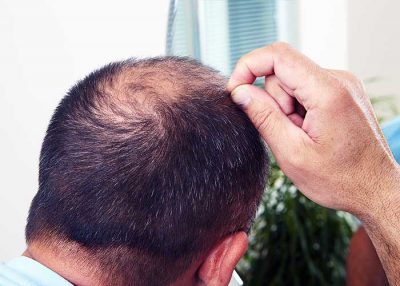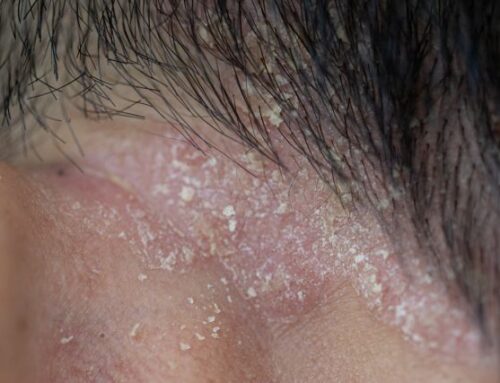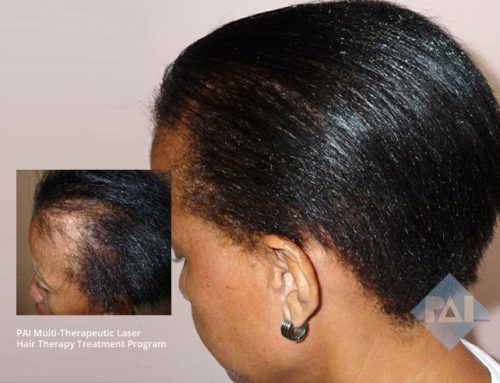Your Receding Hairline – Stress & Hair Loss
Struggling with a receding hairline? Stress might be to blame. In today’s high-pressure world, the impact of stress goes far beyond mental and emotional well-being—it can also take a toll on your hair, leading to thinning and a receding hairline. If you’ve noticed your hairline inching backward, this is a good time to examine the very real connection between stress and hair loss. What is the exact nature of the relationship between a receding hairline, stress, and hair loss? What are the latest clinical treatments designed to help you reclaim your confidence and your hairline?
The Real Link Between Stress and Hair Loss
 When we talk about stress-related hair loss, we’re often referring to a condition called telogen effluvium. This specific form of hair loss occurs when stress disrupts the natural hair growth cycle, pushing a large number of hair follicles into the resting (telogen) phase prematurely. As a result, these hairs fall out, leading to noticeable thinning and potentially a receding hairline.
When we talk about stress-related hair loss, we’re often referring to a condition called telogen effluvium. This specific form of hair loss occurs when stress disrupts the natural hair growth cycle, pushing a large number of hair follicles into the resting (telogen) phase prematurely. As a result, these hairs fall out, leading to noticeable thinning and potentially a receding hairline.
Telogen effluvium can be triggered by various types of stress, ranging from emotional upheavals to physical traumas. Some common stressors that may lead to a receding hairline include:
- Chronic emotional stress (e.g., work-related stress, relationship problems)
- Major life changes (e.g., divorce, job loss, relocation)
- Physical trauma or injury
- Severe illnesses or infections
- Hormonal changes (e.g., childbirth, menopause)
- Nutritional deficiencies
- Certain medications
It’s important to note that not all stress will necessarily lead to hair loss or a receding hairline. The severity and duration of the stress play crucial roles in determining its impact on your hair.
The Science Behind Stress-Induced Hair Loss
To understand how stress can cause your hairline to recede, we need to delve into the biology of hair growth. Normally, human hair growth occurs in three phases:
- Anagen (growth phase)
- Catagen (transitional phase)
- Telogen (resting phase)
In a healthy hair cycle, about 85-90% of our hair is in the anagen phase, while only 10-15% is in the telogen phase. However, when we experience significant stress, it can disrupt this delicate balance.
Stress triggers the release of cortisol, often called the “stress hormone.” Elevated cortisol levels can interfere with the function and regeneration of hair follicles. This interference can cause a larger percentage of hair follicles to enter the telogen phase simultaneously, leading to increased hair shedding and a potential receding hairline.
Moreover, stress can also lead to other behaviors or conditions that may exacerbate hair loss, such as:
- Poor nutrition due to stress-induced changes in appetite
- Decreased blood flow to the scalp
- Weakened immune system, making hair follicles more susceptible to damage
- Trichotillomania, a stress-related habit of pulling out one’s own hair
Recognizing Stress-Induced Hair Loss and Receding Hairline
If you’re concerned about stress causing your hairline to recede, it’s essential to know what to look for. Unlike male or female pattern baldness, which typically causes gradual thinning in specific areas, stress-induced hair loss often presents as overall thinning across the scalp, including the hairline.
Some signs that stress might be causing your hairline to recede include:
- Sudden increase in hair shedding (more than 100 hairs per day)
- Thinning hair at the temples or crown
- Widening of the part line
- Noticeable reduction in hair volume when styling
It’s worth noting that stress-induced hair loss, including a receding hairline, typically becomes apparent 3-6 months after the stressful event. This delay is due to the hair growth cycle’s nature, where hairs in the telogen phase take time to fall out.
Treating Stress-Induced Hair Loss
The good news is that stress-induced hair loss, including a receding hairline, is often temporary. Once the underlying stress is addressed, hair growth usually resumes naturally. However, this process can take several months, and in some cases, additional treatment may be beneficial to promote faster and healthier hair regrowth.
At Grow Your Hair Back Hair Restoration, we offer several innovative treatments that can help combat stress-induced hair loss and receding hairlines:
Enhanced Hair Therapy (EHT)
Enhanced Hair Therapy (EHT) treatment at our Washington DC area hair restoration clinic is a comprehensive, non-surgical treatment program designed to stop hair loss and promote regrowth. This clinically proven therapy combines several approaches to address hair loss from multiple angles:
- Scalp treatments to create an optimal environment for hair growth
- Nutritional supplements to support healthy hair from within
- Topical treatments to stimulate hair follicles
- Prescription medications to address hormonal factors in hair loss
EHT is particularly effective for stress-induced hair loss as it helps to reset the hair growth cycle and provide the necessary nutrients for robust hair growth. Many patients see significant improvements in hair density and a reduction in receding hairline within 3-6 months of starting treatment.
Low-Level Laser Hair Therapy
Another promising treatment option for stress-induced hair loss and receding hairlines is low-level laser hair therapy. This FDA-cleared treatment uses red light technology to stimulate hair follicles at a cellular level, promoting increased blood flow to the scalp and enhancing the delivery of nutrients to hair follicles.
Low-level laser therapy offers several benefits for those experiencing stress-related hair loss:
- Increases cellular metabolism and protein synthesis
- Improves blood circulation in the scalp
- Reduces inflammation around hair follicles
- Strengthens existing hair and promotes thicker, fuller-looking hair
This non-invasive treatment can be an excellent option for those looking to address a receding hairline caused by stress, as it not only helps to regrow hair but also improves the overall health of the scalp and existing hair.
Taking Action Against Stress-Induced Hair Loss
While stress-induced hair loss and a receding hairline can be distressing, it’s important to remember that solutions are available. By addressing the underlying stress and seeking appropriate treatment, you can often reverse the effects and restore your hairline to its former glory.
If you are concerned about stress causing your hairline to recede, the first step is to consult with hair restoration experts. At Grow Your Hair Back Hair Restoration, we offer free, private consultations to discuss your hair loss concerns and develop a personalized treatment plan.
During your consultation, our experienced hair restoration specialists will:
- Assess your hair loss pattern and severity
- Discuss your medical history and potential stress factors
- Perform a scalp analysis to determine the health of your hair follicles
- Recommend the most suitable treatment options for your specific case
Don’t let stress-induced hair loss and a receding hairline impact your confidence and quality of life. Take the first step towards reclaiming your hair by scheduling a free consultation with Grow Your Hair Back Hair Restoration today. Our team of experts is ready to help you understand the cause of your hair loss and guide you towards the most effective hair loss solutions to meet your specific needs.
Remember, stress-induced hair loss is often temporary, and with the right approach, you can not only stop your hairline from receding but also promote healthier, fuller hair growth. Whether through Enhanced Hair Therapy, low-level laser treatments, or a combination of approaches, we’re here to support you on your journey to hair restoration.
Don’t wait for your hairline to recede further. Contact Grow Your Hair Back Hair Restoration now and take control of your hair health. Your future self, with a fuller, healthier hairline, will thank you for taking action today.



